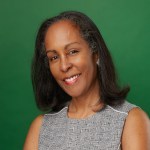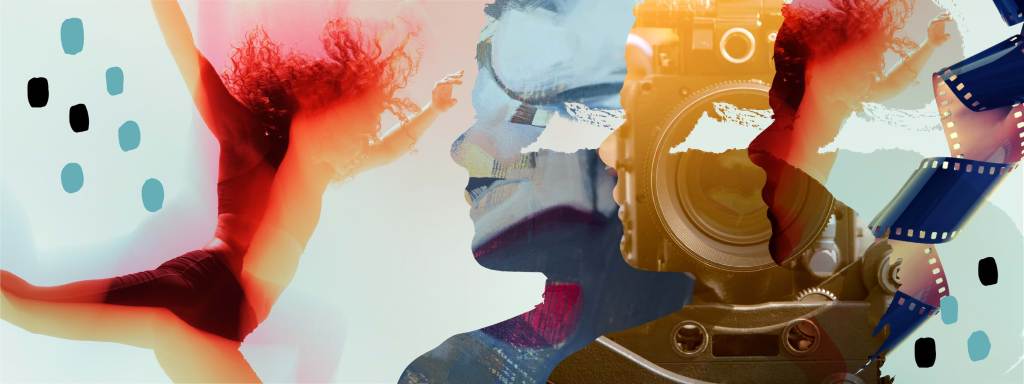
“In one way or another, my work endlessly explodes the limits of tradition. I’m determined to find new models to live by.” Those are the words of Carrie Mae Weems, who has defied expectations as both an artist and an African American woman throughout her illustrious career.
Over the years, we have supported Weems and a number of distinguished women writers, artists, filmmakers and storytellers. They are not just finding—and creating—new models to live by but breaking down barriers, forging new paths, and expanding possibilities for generations of women to come. They are women like Wangechi Mutu, who is harnessing the power of art and creativity to radically shift the narratives around Africa, and Alice Wong, who is unstoppable in her efforts to bring visibility to the work of disability activists.

This piece is part of our featured series, The Future Is Hers, celebrating the power of women and girls around the world.
By using their gender as a lens and their work to amplify women’s voices, issues and perspectives, they are changing society’s perceptions of women and forcing the world to rethink the very definition of the arts.
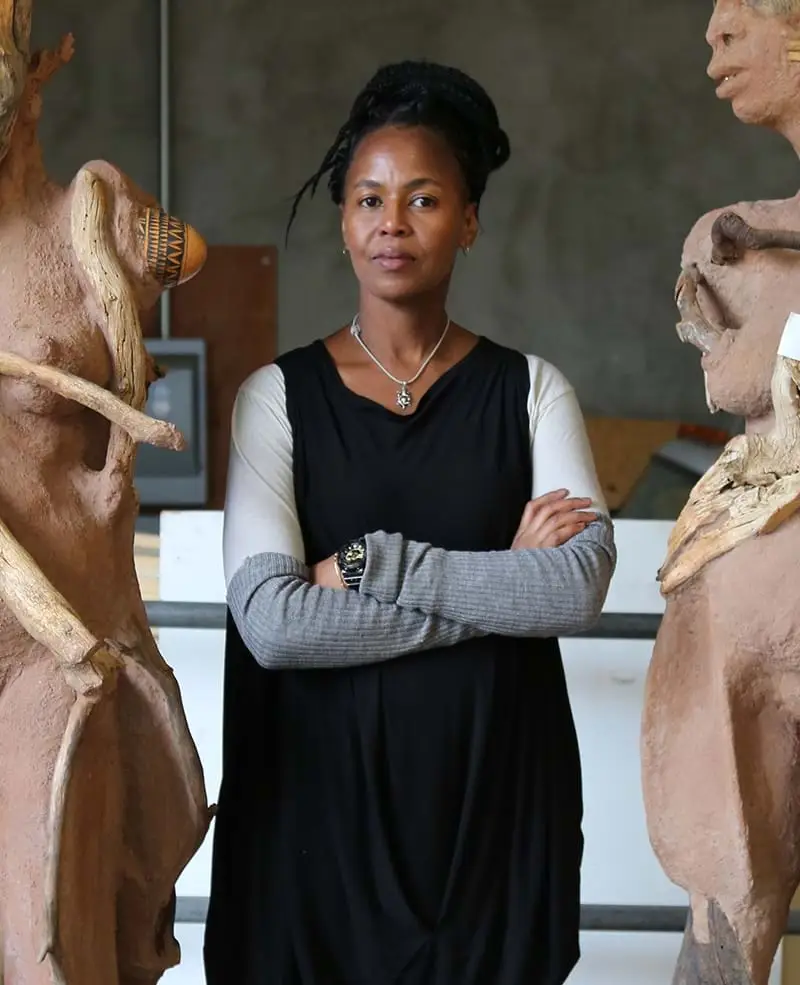 Cynthia Edorh
Cynthia EdorhWangechi Mutu
Working in a variety of mediums including painting-collage, sculpture, experimental performance and video, Wangechi Mutu creates new ways to see ourselves by bending and distorting gender, racial, cultural and historical constructs, highlighting the trauma that inevitably feeds into destruction of the environment. With her characteristic morphing, hybrid, and organic forms, she portrays shared and inherent alienations. In Mutu’s work, identity has performative qualities and she calls upon the figure as a place through which to rewrite and reimagine oneself and to break certain codes of the man-made and natural world.
An artist of Kenyan descent, Mutu has been the subject of major solo exhibitions at institutions worldwide. Most recently, she was included in the 2019 Whitney Biennial and is currently in The Metropolitan Museum of Art’s “The Façade Commission: Wangechi Mutu, The NewOnes, will free Us.”
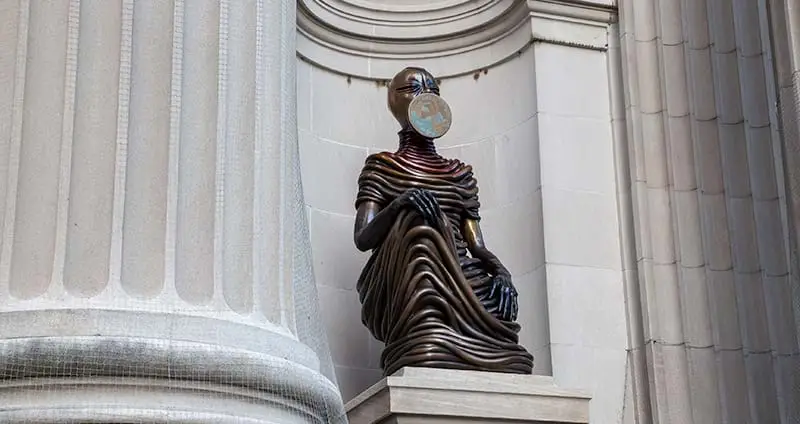
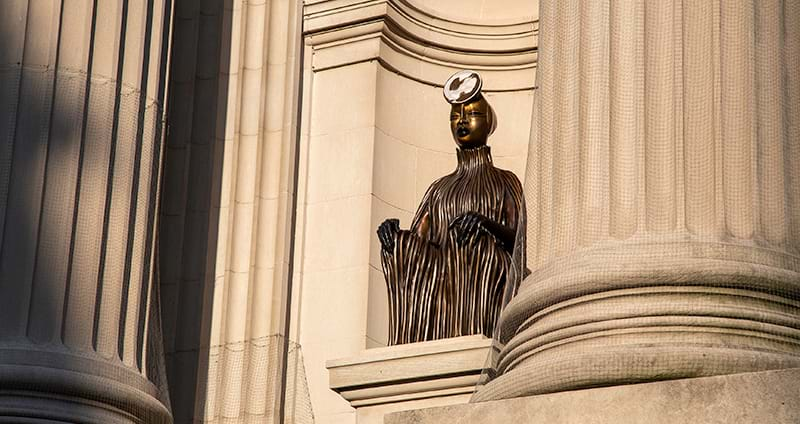
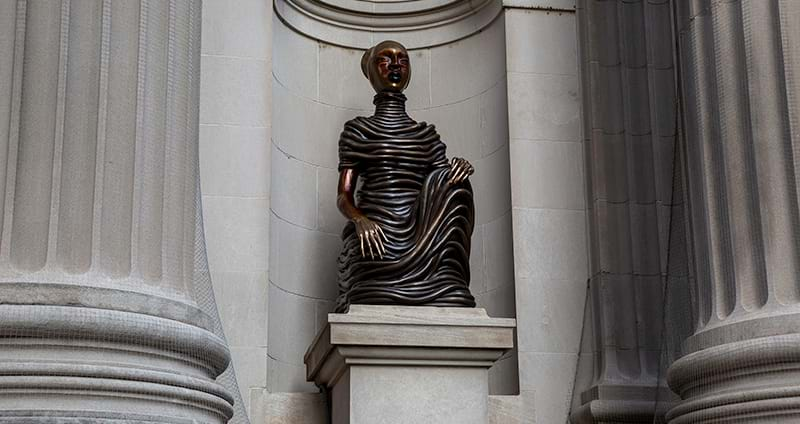
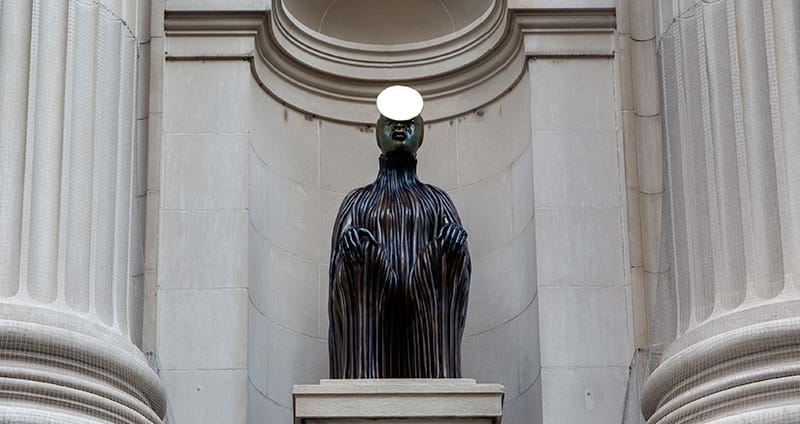
Wangechi Mutu calls the bronze figures of “The NewOnes, will free Us” “liberated caryatids” after the sculptures of women that act as pillars in architecture. Courtesy of the Metropolitan Museum of Art
Laura Poitras
After filmmaker Laura Poitras received encrypted emails with classified information on the United States National Security Agency (NSA), she and journalist Glenn Greenwald flew to Hong Kong to meet the sender: Edward Snowden. Her journey to unearth the NSA’s mass indiscriminate and illegal surveillance is thrillingly chronicled in Citizenfour. The film ushered in a new era of understanding of state surveillance in America and earned Poitras an Academy Award and BAFTA for Best Documentary. A MacArthur Fellow and Ford Art of Change Fellow, Poitras has continued to take on controversial subjects in her investigative films as well as her work as co-founder of The Intercept, the online news organization focused on holding the powerful accountable, and co-founder of Field of Vision, the visual journalism unit of Pierre Omidyar’s First Look Media that produces short films with fresh perspectives.
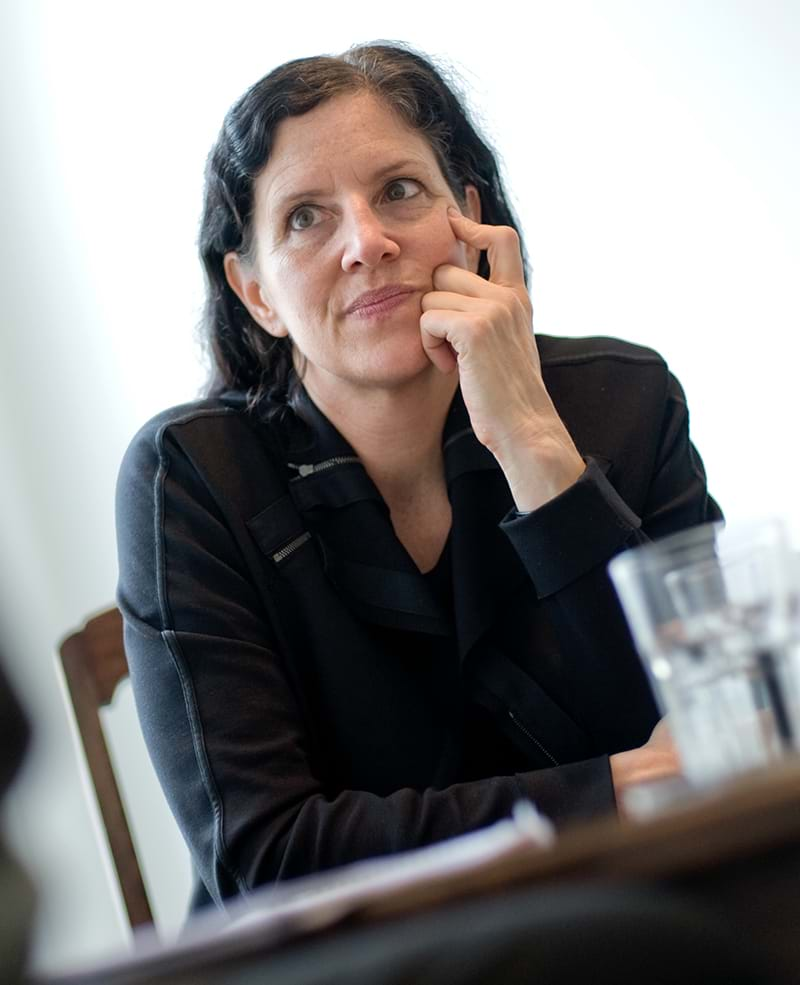 Britta Pedersen/picture alliance via Getty Images
Britta Pedersen/picture alliance via Getty ImagesAccessibility Statement
- All videos produced by the Ford Foundation since 2020 include captions and downloadable transcripts. For videos where visuals require additional understanding, we offer audio-described versions.
- We are continuing to make videos produced prior to 2020 accessible.
- Videos from third-party sources (those not produced by the Ford Foundation) may not have captions, accessible transcripts, or audio descriptions.
- To improve accessibility beyond our site, we’ve created a free video accessibility WordPress plug-in.
Accessibility Statement
- All videos produced by the Ford Foundation since 2020 include captions and downloadable transcripts. For videos where visuals require additional understanding, we offer audio-described versions.
- We are continuing to make videos produced prior to 2020 accessible.
- Videos from third-party sources (those not produced by the Ford Foundation) may not have captions, accessible transcripts, or audio descriptions.
- To improve accessibility beyond our site, we’ve created a free video accessibility WordPress plug-in.
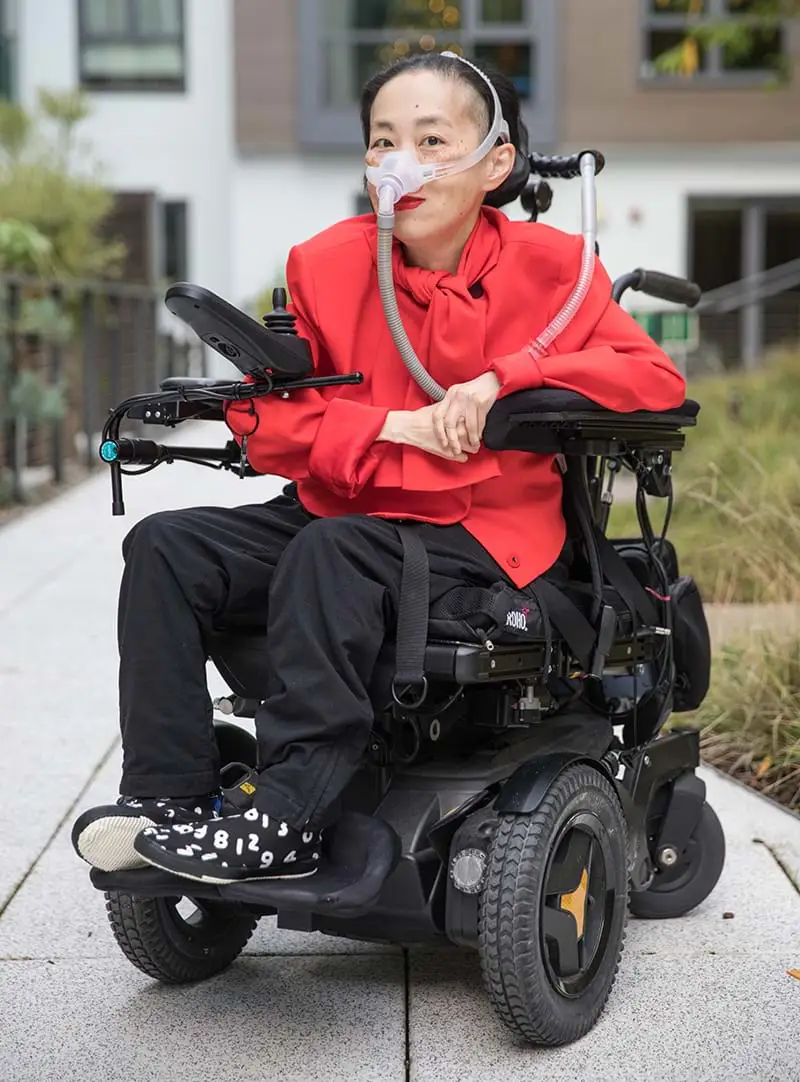 Eddie Hernandez
Eddie HernandezAlice Wong
When disability activist Alice Wong set out to create the Disability Visibility Project (DVP), she had no small ambition. Her aim? To record disability history, one story at a time. And she is doing just that through the Ford-funded project, which encourages people with disabilities to contribute their stories to StoryCorps’ growing collection and share their experiences with DVP’s online community. Wong, who served on the National Council for Disability, has dedicated her career to creating, sharing, and amplifying disability stories and culture. Her work has been published in the New York Times, Teen Vogue, Transom, and Rooted in Rights. As the disability arts and justice movements gain more visibility, Wong has been on the forefront of activism at the local and national levels with disability mediamaking that is helping to shift narratives about the community.
Disability Visibility Project Ep 72: Disabled Curators
Jawole Willa Jo Zollar
A renowned American dancer, teacher and choreographer of modern dance, Jawole Willa Jo Zollar is the founder of Urban Bush Women, a Brooklyn-based dance company that brings to light the untold and overlooked stories of disenfranchised communities through dance, all from the perspective of a black woman and a member of the African diaspora. Since the company’s creation in 1984, Zollar has demonstrated the power of performance and cultural expression to catalyze social change and drive conversation around controversial topics such as racism, sexism, abortion and homelessness. By using dance as both the message and medium, she has created a highly innovative way for a diverse mix of communities to connect and engage with one another. Most recently, she established the Urban Bush Women’s Choreographic Center, a 10-year initiative to address issues of equity for women, particularly women of color, in the field of dance.
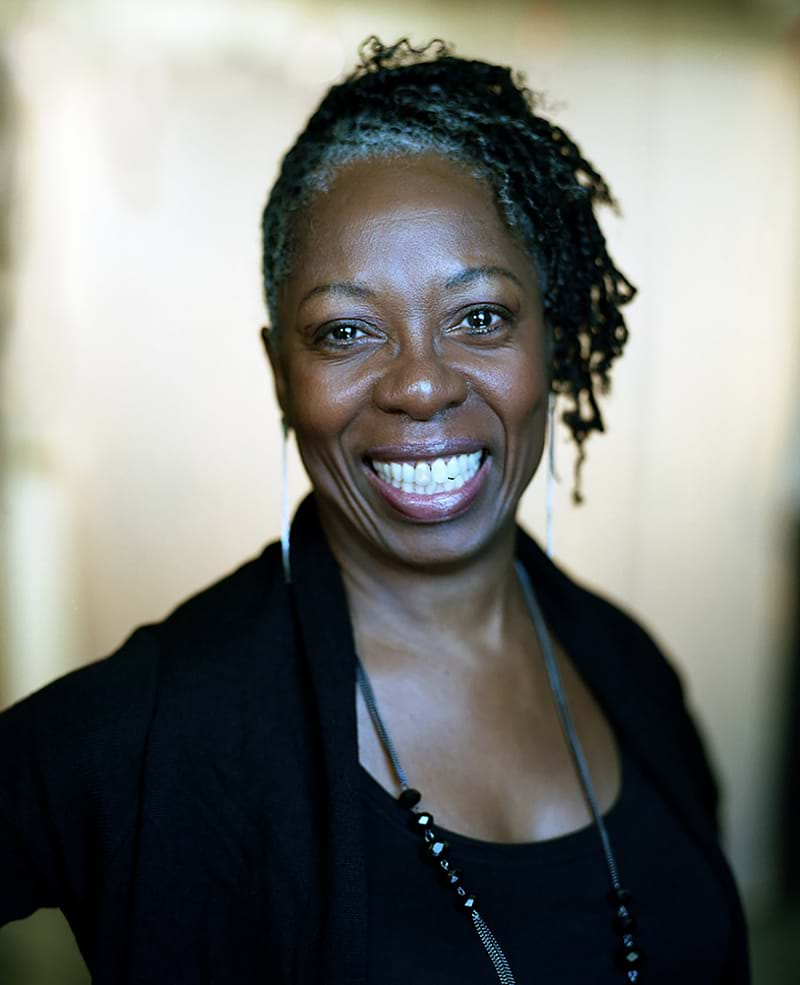 Crush Boone
Crush BooneAccessibility Statement
- All videos produced by the Ford Foundation since 2020 include captions and downloadable transcripts. For videos where visuals require additional understanding, we offer audio-described versions.
- We are continuing to make videos produced prior to 2020 accessible.
- Videos from third-party sources (those not produced by the Ford Foundation) may not have captions, accessible transcripts, or audio descriptions.
- To improve accessibility beyond our site, we’ve created a free video accessibility WordPress plug-in.
Accessibility Statement
- All videos produced by the Ford Foundation since 2020 include captions and downloadable transcripts. For videos where visuals require additional understanding, we offer audio-described versions.
- We are continuing to make videos produced prior to 2020 accessible.
- Videos from third-party sources (those not produced by the Ford Foundation) may not have captions, accessible transcripts, or audio descriptions.
- To improve accessibility beyond our site, we’ve created a free video accessibility WordPress plug-in.
“Walking with ‘Trane” is a production inspired by the life and music of jazz icon John Coltrane, conceived and performed by the Urban Bush Women.
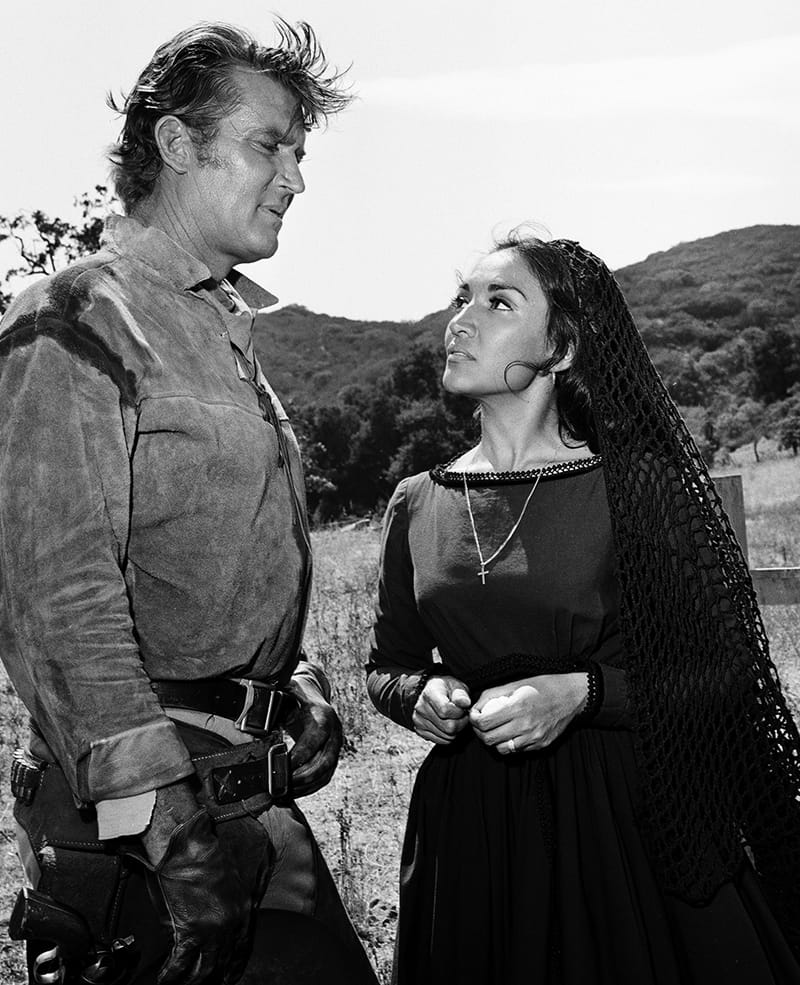 Fred Sabine/NBC/NBCU Photo Bank
Fred Sabine/NBC/NBCU Photo BankMiriam Colón
Hailing from Puerto Rico, Miriam Colón (1936-2017) was an acclaimed actress whose career spanned dozens of television and film roles, from Scarface to Alfred Hitchcock Presents, and hundreds of theater productions. In 1967, she co-founded one of America’s first bilingual companies, known as The Puerto Rican Traveling Theater, in New York, and empowered Hispanic artists and audiences to claim their rightful place in American theater. The company, funded by Ford, put on productions throughout the city to make the arts accessible to all and nurtured the development of hundreds of artists across the Hispanic community. Colón served as its Artistic Director until it merged with Pregones in 2014. Pregones, a multigenerational, multidisciplinary ensemble operating out of the Bronx, remains an important space for Hispanic artists and communities and carries on the cultural legacy Colón helped to pioneer.
Carrie Mae Weems
When Carrie Mae Weems was first teaching photography in the 1980s in Massachusetts, she was struck by the difference in how men and women in her class presented themselves in pictures. While the men squared themselves to face the camera, the women were always in profile, turned away from the lens. At night, she would return to her studio to work on her own photographs that told a different story. The result was “The Kitchen Table Series,” an iconic collection of meticulously composed vignettes that offer a meditation on identity and the relationships a black woman has with her partner, her friends and herself. Since then, Weems has defined her 30-year career as an artist by examining questions of love, power and the greater issues of humanity, creating spaces for contemplation, and removing the cloud of invisibility around African Americans and their complex history in the United States. By contesting assumptions about her largely black subjects and unabashedly insisting on their worth, particularly black women, she has created a multidimensional portrait of African American history and reset expectations about what’s possible with art. Today, she is one of America’s most influential artists and the only black woman to have a retrospective at the Guggenheim in New York.
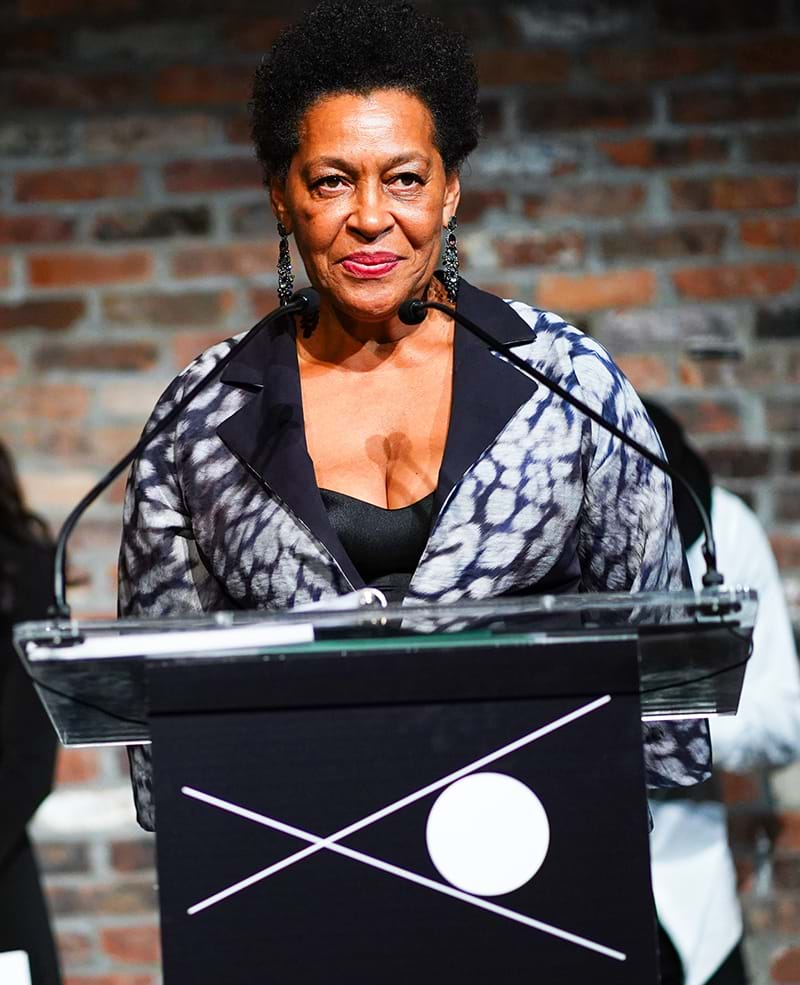 Stefanie Keenan/Getty Images for CalArts
Stefanie Keenan/Getty Images for CalArtsAccessibility Statement
- All videos produced by the Ford Foundation since 2020 include captions and downloadable transcripts. For videos where visuals require additional understanding, we offer audio-described versions.
- We are continuing to make videos produced prior to 2020 accessible.
- Videos from third-party sources (those not produced by the Ford Foundation) may not have captions, accessible transcripts, or audio descriptions.
- To improve accessibility beyond our site, we’ve created a free video accessibility WordPress plug-in.
Accessibility Statement
- All videos produced by the Ford Foundation since 2020 include captions and downloadable transcripts. For videos where visuals require additional understanding, we offer audio-described versions.
- We are continuing to make videos produced prior to 2020 accessible.
- Videos from third-party sources (those not produced by the Ford Foundation) may not have captions, accessible transcripts, or audio descriptions.
- To improve accessibility beyond our site, we’ve created a free video accessibility WordPress plug-in.
 William B. Plowman/NBC/NBC Newswire/NBCUniversal via Getty Images
William B. Plowman/NBC/NBC Newswire/NBCUniversal via Getty ImagesMaria Hinojosa
As a reporter who was the first Latina in many newsrooms, award-winning journalist Maria Hinojosa has spent the last 25 years helping to tell America’s untold stories and bring voice to the voiceless. In an effort to shine a light on those stories and those individuals, she founded the Futuro Media Group, a Ford-Funded project that harnesses the power of independent media to bring attention to the stories overlooked or underreported by traditional media and explore the diversity of the American experience from the perspectives of communities of color and Latinx populations. For the last 10 years, Futuro has created multi-platform, community-based content for and about the new American mainstream to empower them to navigate the complexities of an increasingly diverse and connected world. In addition to her work with Futuro, Hinojosa has been incredibly successful in carving out a lane for Latinx communities in the mainstream media, particularly as host of NPR’s Latino USA and anchor and executive producer of the PBS show America By The Numbers, the first national TV series to examine the country’s dramatic demographic shifts.
Accessibility Statement
- All videos produced by the Ford Foundation since 2020 include captions and downloadable transcripts. For videos where visuals require additional understanding, we offer audio-described versions.
- We are continuing to make videos produced prior to 2020 accessible.
- Videos from third-party sources (those not produced by the Ford Foundation) may not have captions, accessible transcripts, or audio descriptions.
- To improve accessibility beyond our site, we’ve created a free video accessibility WordPress plug-in.
Accessibility Statement
- All videos produced by the Ford Foundation since 2020 include captions and downloadable transcripts. For videos where visuals require additional understanding, we offer audio-described versions.
- We are continuing to make videos produced prior to 2020 accessible.
- Videos from third-party sources (those not produced by the Ford Foundation) may not have captions, accessible transcripts, or audio descriptions.
- To improve accessibility beyond our site, we’ve created a free video accessibility WordPress plug-in.
Lynn Nottage
An American playwright and screenwriter, Lynn Nottage is the first and only woman to date to win a Pulitzer Prize for Drama twice, the first for 2009’s Ruined and the second for 2017’s Sweat, a fascinating examination of race and the working class in Reading, Pennsylvania funded by Ford. In Sweat and in much of her work, Nottage explores difficult themes such as identity, alienation, politics, war and industrialization with empathy and humanity by creating authentic, often invisible characters like an African American seamstress or a steelworker living on the poverty line. The Tony-winning Sweat debuted on Broadway in 2017 as President Trump took office, and its timely message led to a tour across America’s Rust Belt before making its way to London’s West End. Nottage—whose accolades range from being named a MacArthur Fellow to one of Time’s 100 Most Influential People—continues to develop original projects for the stage as well as HBO, Showtime and Netflix.
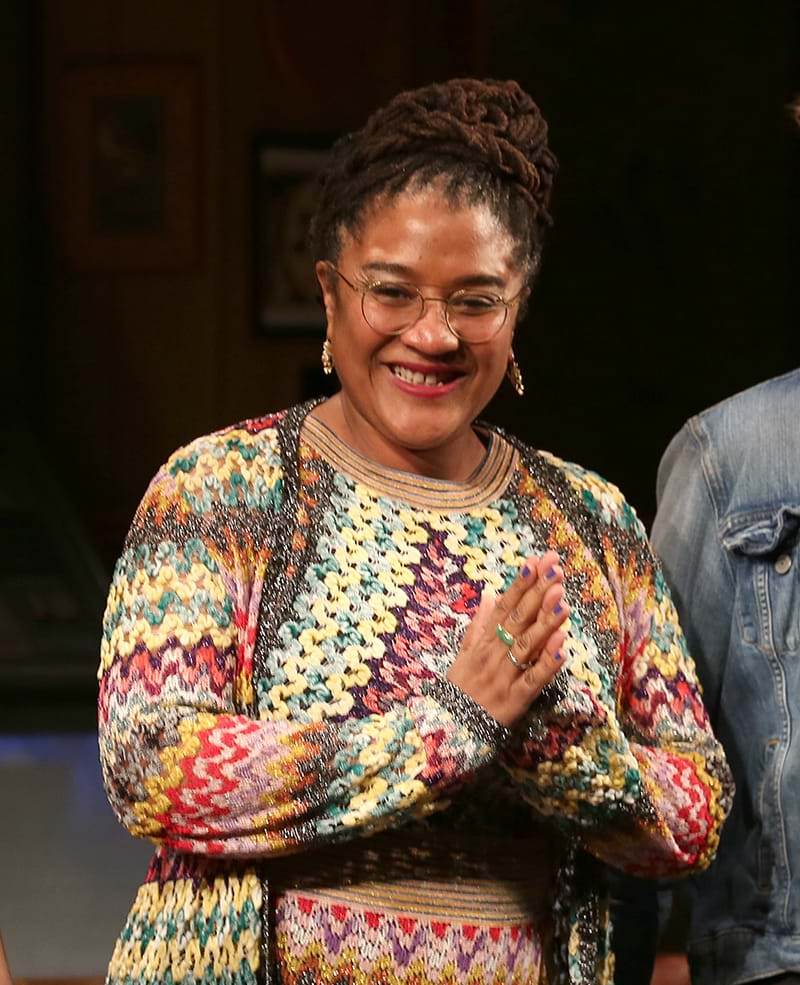 Walter McBride/WireImage
Walter McBride/WireImage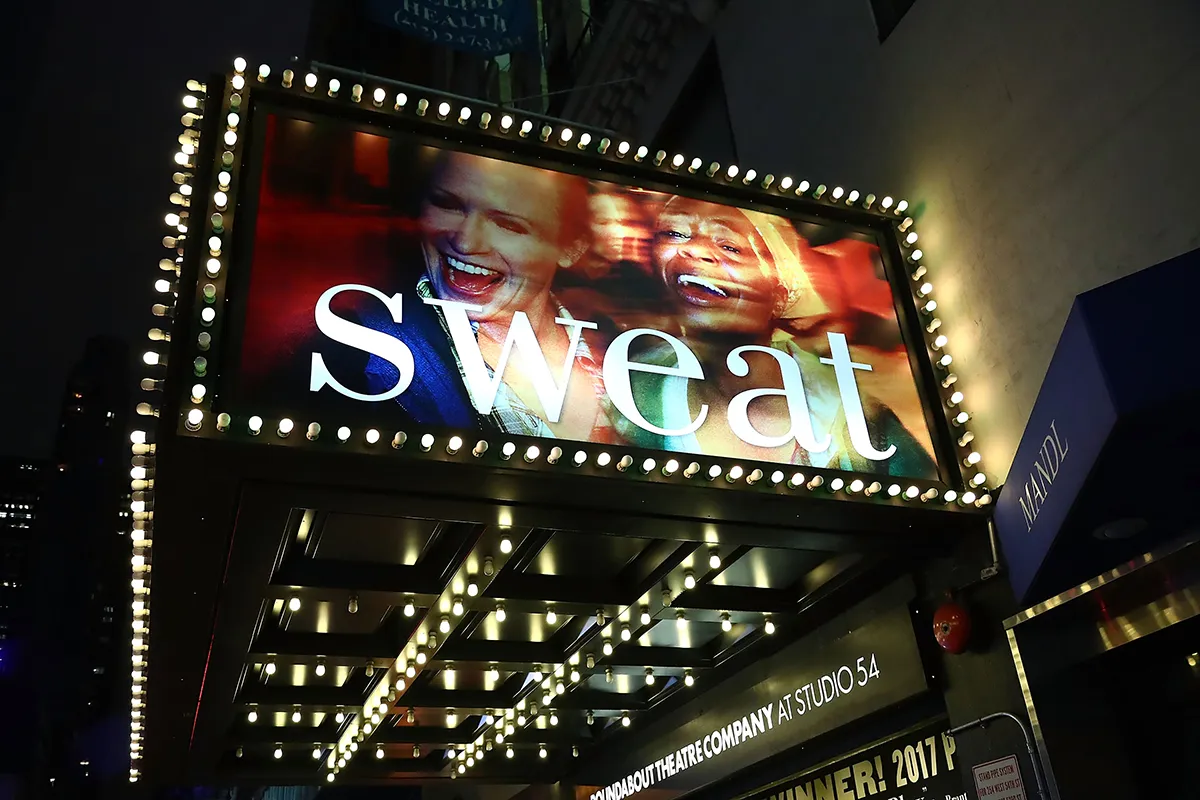
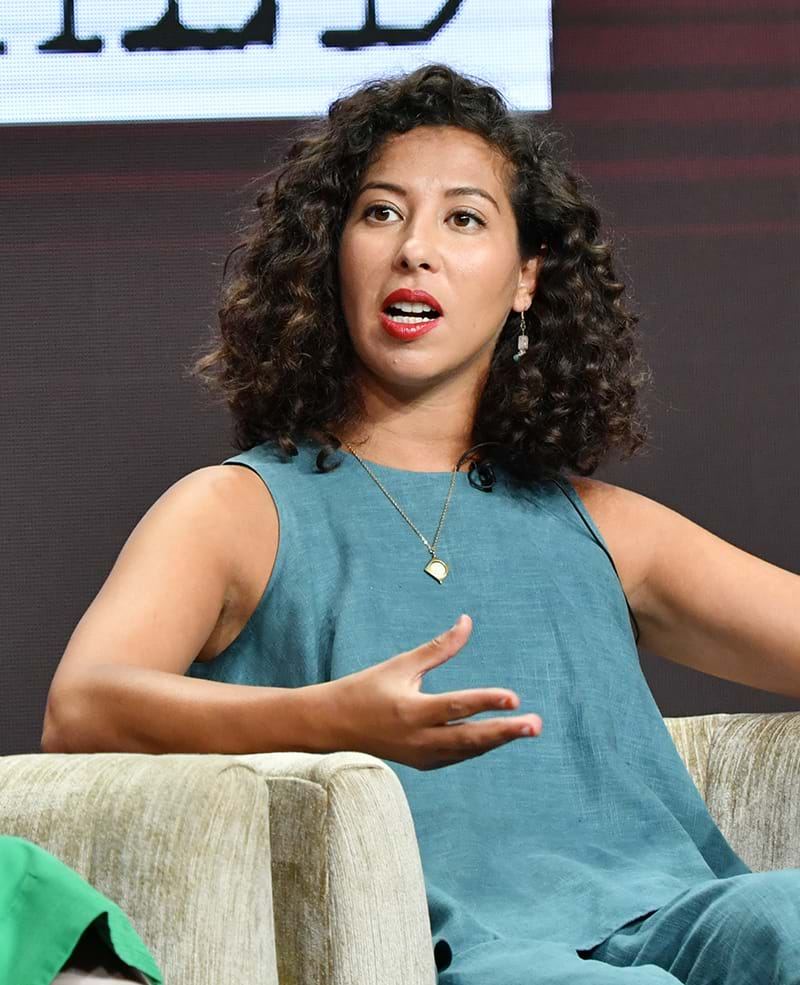 Amy Sussman/Getty Images
Amy Sussman/Getty ImagesAssia Boundaoui
An Algerian-American filmmaker, Assia Boundaoui grew up in Bridgeview, Illinois, a predominantly Muslim community outside of Chicago. In her first feature film, The Feeling of Being Watched, she revisits a childhood under a blanket of scrutiny by the FBI. A journalist by trade, Boundaoui began to investigate rumors of surveillance in her neighborhood only to end up uncovering one of the largest terrorism probes conducted before 9/11. Funded by JustFilms, the documentary weaves together the personal and the political as Boundaoui takes the FBI to court to make thousands of documents public while grappling with the enduring impact of a lifetime of state surveillance on her and her family. Since the film’s debut at the Tribeca Film Festival in 2018, Boundaoui, with Ford’s support, has created the Inverse Surveillance Project to connect with other scrutinized communities across the US in an attempt to collectively heal and push for more transparency in government records and data.
Accessibility Statement
- All videos produced by the Ford Foundation since 2020 include captions and downloadable transcripts. For videos where visuals require additional understanding, we offer audio-described versions.
- We are continuing to make videos produced prior to 2020 accessible.
- Videos from third-party sources (those not produced by the Ford Foundation) may not have captions, accessible transcripts, or audio descriptions.
- To improve accessibility beyond our site, we’ve created a free video accessibility WordPress plug-in.
Accessibility Statement
- All videos produced by the Ford Foundation since 2020 include captions and downloadable transcripts. For videos where visuals require additional understanding, we offer audio-described versions.
- We are continuing to make videos produced prior to 2020 accessible.
- Videos from third-party sources (those not produced by the Ford Foundation) may not have captions, accessible transcripts, or audio descriptions.
- To improve accessibility beyond our site, we’ve created a free video accessibility WordPress plug-in.
Shelley Barry
In 1996, Shelley Barry, then 23, was caught in the crossfire of a violent rivalry between two taxi companies in Cape Town, South Africa. The driver of her minibus was shot seven times, and one of the bullets hit Barry who was instantly paralyzed. Her experience turned her into a disability rights activist, initially as the National Parliamentary Policy Coordinator for Disabled People South Africa during the Presidency of Nelson Mandela before finding her calling as a filmmaker. Over the last 20 years, she has used film and visual media to reclaim her body—starting with her award-winning experimental documentary, Whole: A Trinity of Being—and explore the aesthetics of cinematography from the perspective of a wheelchair. Her aim, with every project, is to challenge misperceptions about disabled individuals and bring attention to the realities of those communities.
Accessibility Statement
- All videos produced by the Ford Foundation since 2020 include captions and downloadable transcripts. For videos where visuals require additional understanding, we offer audio-described versions.
- We are continuing to make videos produced prior to 2020 accessible.
- Videos from third-party sources (those not produced by the Ford Foundation) may not have captions, accessible transcripts, or audio descriptions.
- To improve accessibility beyond our site, we’ve created a free video accessibility WordPress plug-in.
Accessibility Statement
- All videos produced by the Ford Foundation since 2020 include captions and downloadable transcripts. For videos where visuals require additional understanding, we offer audio-described versions.
- We are continuing to make videos produced prior to 2020 accessible.
- Videos from third-party sources (those not produced by the Ford Foundation) may not have captions, accessible transcripts, or audio descriptions.
- To improve accessibility beyond our site, we’ve created a free video accessibility WordPress plug-in.
Michele Norris
When veteran journalist Michele Norris began writing her memoir, The Grace of Silence, she set out to explore America’s hidden conversation about race, but soon realized how her life—and the lives of many others—was shaped by the weight of silence. That personal revelation led her to create the Race Card Project, a social experiment designed to spark a national conversation about race, identity and what it means to be an American. Recognizing that race has long been a difficult topic of discussion in the United States, Norris started small, capturing six-word stories from citizens on their experiences, perceptions and notions. To date, the Race Card Project, which Ford funds, has collected more than 50,000 stories—from “I’m only Asian, when it’s convenient” to “Why do I do that when I see a black man?”—that are helping Americans challenge their thinking, examine the country’s racial and cultural DNA, and focus on their similarities, rather than their differences, to come together as a people.
Accessibility Statement
- All videos produced by the Ford Foundation since 2020 include captions and downloadable transcripts. For videos where visuals require additional understanding, we offer audio-described versions.
- We are continuing to make videos produced prior to 2020 accessible.
- Videos from third-party sources (those not produced by the Ford Foundation) may not have captions, accessible transcripts, or audio descriptions.
- To improve accessibility beyond our site, we’ve created a free video accessibility WordPress plug-in.
Accessibility Statement
- All videos produced by the Ford Foundation since 2020 include captions and downloadable transcripts. For videos where visuals require additional understanding, we offer audio-described versions.
- We are continuing to make videos produced prior to 2020 accessible.
- Videos from third-party sources (those not produced by the Ford Foundation) may not have captions, accessible transcripts, or audio descriptions.
- To improve accessibility beyond our site, we’ve created a free video accessibility WordPress plug-in.
Joy Harjo
A member of the Muscogee Creek Nation and a lifelong student of First Nation history, Joy Harjo has worked to expand America’s language and cultural history through her poetry and writing. Feeling a responsibility to her past and future ancestors, her tribe and her Native land of Oklahoma, she confronts America’s past—and its present—with both daring and quiet beauty, all in an effort to sustain the spirit and history of Native Americans, making sure society never diminishes the role they played and continue to play in the country. To Harjo, poetry is a way to bridge one country to another, one person to another, and one time to another. Since 1975, Harjo, a Ford Art of Change Fellow, has published eight books of poetry and earned nearly every prominent poetry award, from the Poetry Foundation’s Ruth Lilly Prize to the Wallace Stevens Award from the Academy of American Poets. In 2019, she became the first Native American Poet Laureate of the United States.
Accessibility Statement
- All videos produced by the Ford Foundation since 2020 include captions and downloadable transcripts. For videos where visuals require additional understanding, we offer audio-described versions.
- We are continuing to make videos produced prior to 2020 accessible.
- Videos from third-party sources (those not produced by the Ford Foundation) may not have captions, accessible transcripts, or audio descriptions.
- To improve accessibility beyond our site, we’ve created a free video accessibility WordPress plug-in.
Accessibility Statement
- All videos produced by the Ford Foundation since 2020 include captions and downloadable transcripts. For videos where visuals require additional understanding, we offer audio-described versions.
- We are continuing to make videos produced prior to 2020 accessible.
- Videos from third-party sources (those not produced by the Ford Foundation) may not have captions, accessible transcripts, or audio descriptions.
- To improve accessibility beyond our site, we’ve created a free video accessibility WordPress plug-in.
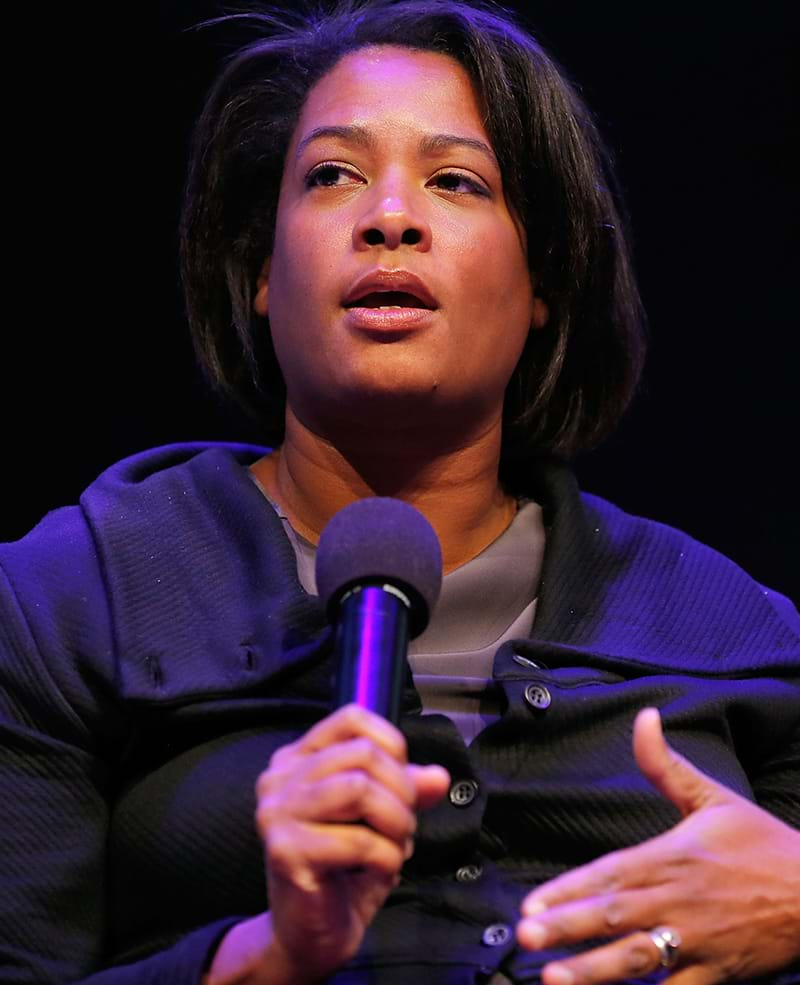 Jemal Countess/WireImage
Jemal Countess/WireImageDawn Porter
When Dawn Porter worked in Standards and Practices at ABC and A&E, she became frustrated by how black men and women were portrayed. Too often, they were negative, one-dimensional portrayals that perpetuated stereotypes. The daughter of a photographer, Porter took a big risk and left that life behind to become a filmmaker committed to telling important stories about the African American experience in the US. Her directorial debut, Gideon’s Army, shed light on the difficult work of public defenders in the South and earned critical praise from Sundance Film Festival and the Independent Spirit Awards. Since then, she has delved into such tough topics as the effects of abortion laws on patients, doctors and clinics in the South (Trapped) and mass incarceration and its impact on men and boys of color (Rise: The Promise of My Brother’s Keeper), and her work has been distributed through HBO, Netflix, Amazon, Time and The New York Times. In May, she is releasing John Lewis: Good Trouble, a portrait of the remarkable life and career of the 79-year-old Congressman and civil rights hero.
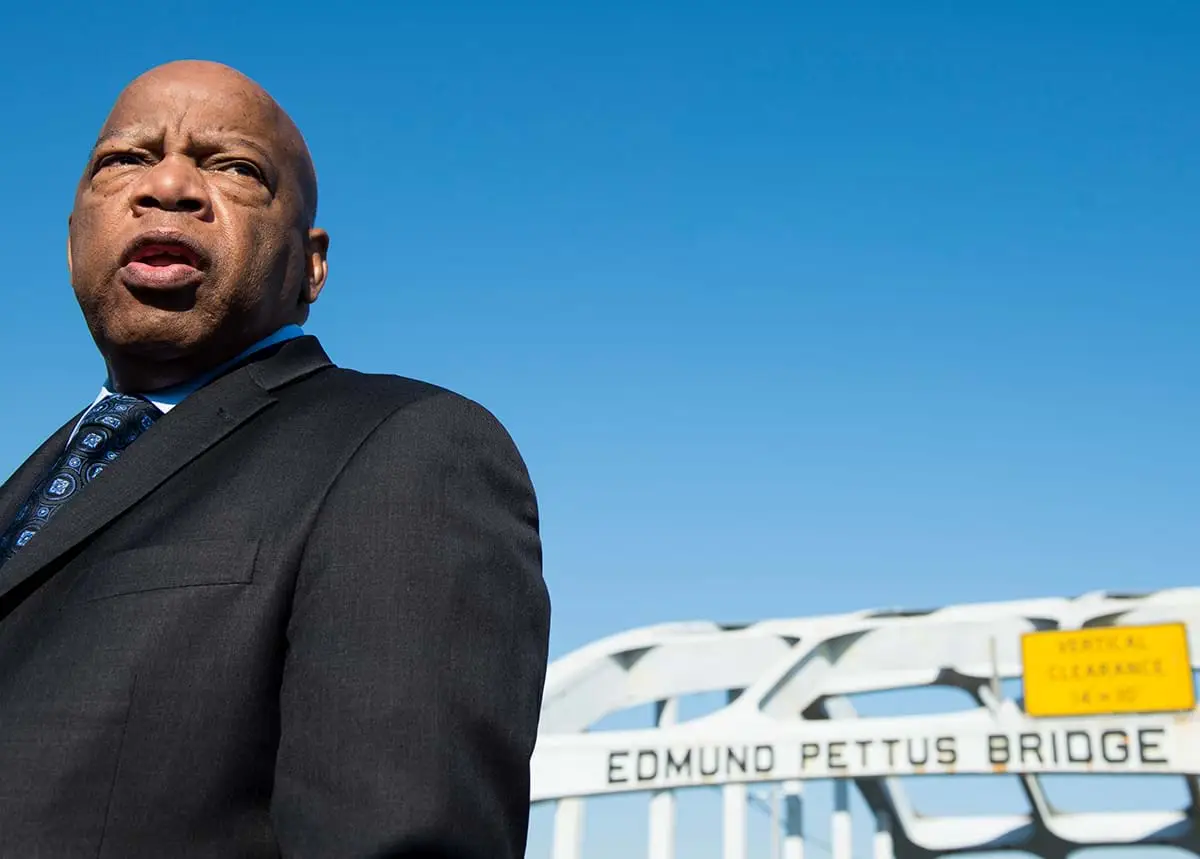
Emily Ramshaw Hartstein
A century ago, the 19th amendment of the US Constitution made voting, America’s most fundamental mode of civic participation, a right regardless of gender. While a watershed moment, it excluded millions of women, including women of color, from the ballot box and kept them from being seen as equal for generations. To Emily Ramshaw Hartstein, the 19th amendment is unfinished business, and it’s that very reason it’s the name of her new venture: a nonprofit, nonpartisan newsroom reporting at the intersection of gender, politics and policy. The mission of The 19th, which launches this summer, is to bring a gender lens to the media. With women underrepresented in politics, policy journalism and newsroom leadership, Hartstein believes women haven’t had the opportunity to influence which stories are told, how the news is covered and whose voices are elevated. Supported by Ford, The 19th aims to empower women—particularly those historically underserved by American media—with the information, community and resources they need to be equal participants in society.
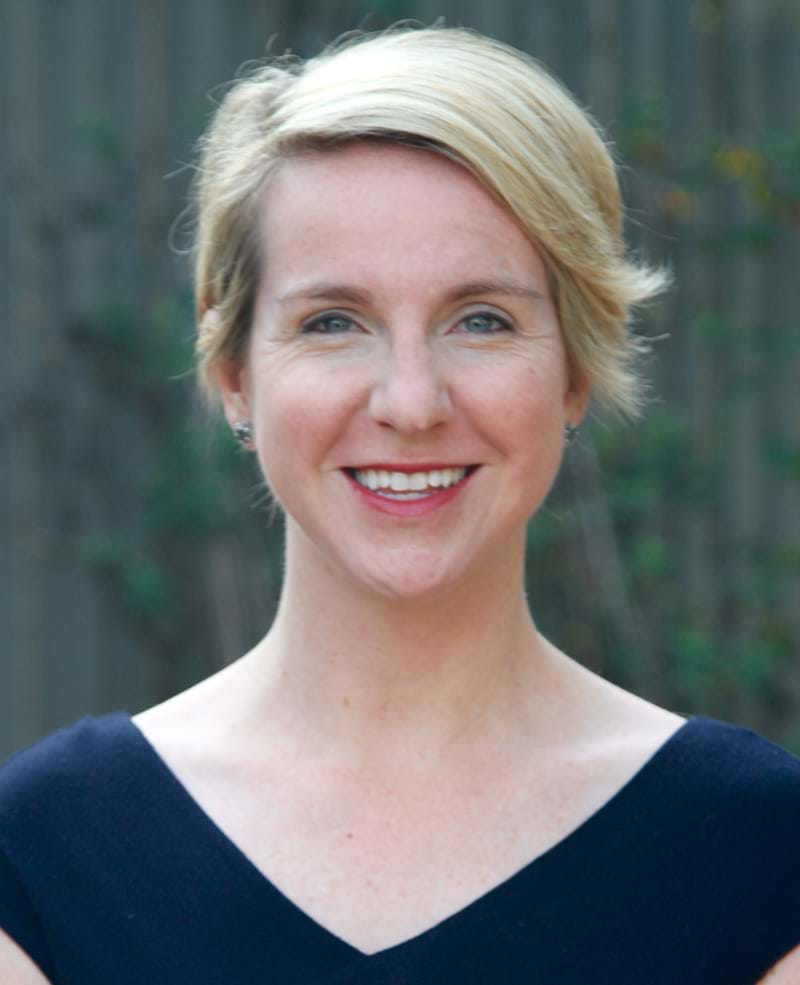 Courtesy of Emily Ramshaw Hartstein
Courtesy of Emily Ramshaw Hartstein
This piece is part of our featured series, The Future Is Hers, celebrating the power of women and girls around the world.
